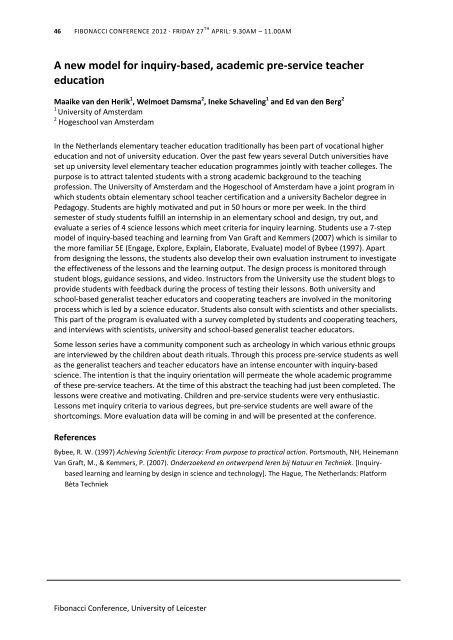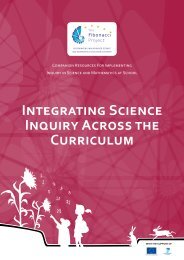disseminating inquiry-based science and ... - Fibonacci-Project
disseminating inquiry-based science and ... - Fibonacci-Project
disseminating inquiry-based science and ... - Fibonacci-Project
You also want an ePaper? Increase the reach of your titles
YUMPU automatically turns print PDFs into web optimized ePapers that Google loves.
46 FIBONACCI CONFERENCE 2012 ∙ FRIDAY 27 TH APRIL: 9.30AM – 11.00AM<br />
A new model for <strong>inquiry</strong>-<strong>based</strong>, academic pre-service teacher<br />
education<br />
Maaike van den Herik 1 , Welmoet Damsma 2 , Ineke Schaveling 1 <strong>and</strong> Ed van den Berg 2<br />
1 University of Amsterdam<br />
2 Hogeschool van Amsterdam<br />
In the Netherl<strong>and</strong>s elementary teacher education traditionally has been part of vocational higher<br />
education <strong>and</strong> not of university education. Over the past few years several Dutch universities have<br />
set up university level elementary teacher education programmes jointly with teacher colleges. The<br />
purpose is to attract talented students with a strong academic background to the teaching<br />
profession. The University of Amsterdam <strong>and</strong> the Hogeschool of Amsterdam have a joint program in<br />
which students obtain elementary school teacher certification <strong>and</strong> a university Bachelor degree in<br />
Pedagogy. Students are highly motivated <strong>and</strong> put in 50 hours or more per week. In the third<br />
semester of study students fulfill an internship in an elementary school <strong>and</strong> design, try out, <strong>and</strong><br />
evaluate a series of 4 <strong>science</strong> lessons which meet criteria for <strong>inquiry</strong> learning. Students use a 7-step<br />
model of <strong>inquiry</strong>-<strong>based</strong> teaching <strong>and</strong> learning from Van Graft <strong>and</strong> Kemmers (2007) which is similar to<br />
the more familiar 5E (Engage, Explore, Explain, Elaborate, Evaluate) model of Bybee (1997). Apart<br />
from designing the lessons, the students also develop their own evaluation instrument to investigate<br />
the effectiveness of the lessons <strong>and</strong> the learning output. The design process is monitored through<br />
student blogs, guidance sessions, <strong>and</strong> video. Instructors from the University use the student blogs to<br />
provide students with feedback during the process of testing their lessons. Both university <strong>and</strong><br />
school-<strong>based</strong> generalist teacher educators <strong>and</strong> cooperating teachers are involved in the monitoring<br />
process which is led by a <strong>science</strong> educator. Students also consult with scientists <strong>and</strong> other specialists.<br />
This part of the program is evaluated with a survey completed by students <strong>and</strong> cooperating teachers,<br />
<strong>and</strong> interviews with scientists, university <strong>and</strong> school-<strong>based</strong> generalist teacher educators.<br />
Some lesson series have a community component such as archeology in which various ethnic groups<br />
are interviewed by the children about death rituals. Through this process pre-service students as well<br />
as the generalist teachers <strong>and</strong> teacher educators have an intense encounter with <strong>inquiry</strong>-<strong>based</strong><br />
<strong>science</strong>. The intention is that the <strong>inquiry</strong> orientation will permeate the whole academic programme<br />
of these pre-service teachers. At the time of this abstract the teaching had just been completed. The<br />
lessons were creative <strong>and</strong> motivating. Children <strong>and</strong> pre-service students were very enthusiastic.<br />
Lessons met <strong>inquiry</strong> criteria to various degrees, but pre-service students are well aware of the<br />
shortcomings. More evaluation data will be coming in <strong>and</strong> will be presented at the conference.<br />
References<br />
Bybee, R. W. (1997) Achieving Scientific Literacy: From purpose to practical action. Portsmouth, NH, Heinemann<br />
Van Graft, M., & Kemmers, P. (2007). Onderzoekend en ontwerpend leren bij Natuur en Techniek. [Inquiry<strong>based</strong><br />
learning <strong>and</strong> learning by design in <strong>science</strong> <strong>and</strong> technology]. The Hague, The Netherl<strong>and</strong>s: Platform<br />
Bèta Techniek<br />
<strong>Fibonacci</strong> Conference, University of Leicester




